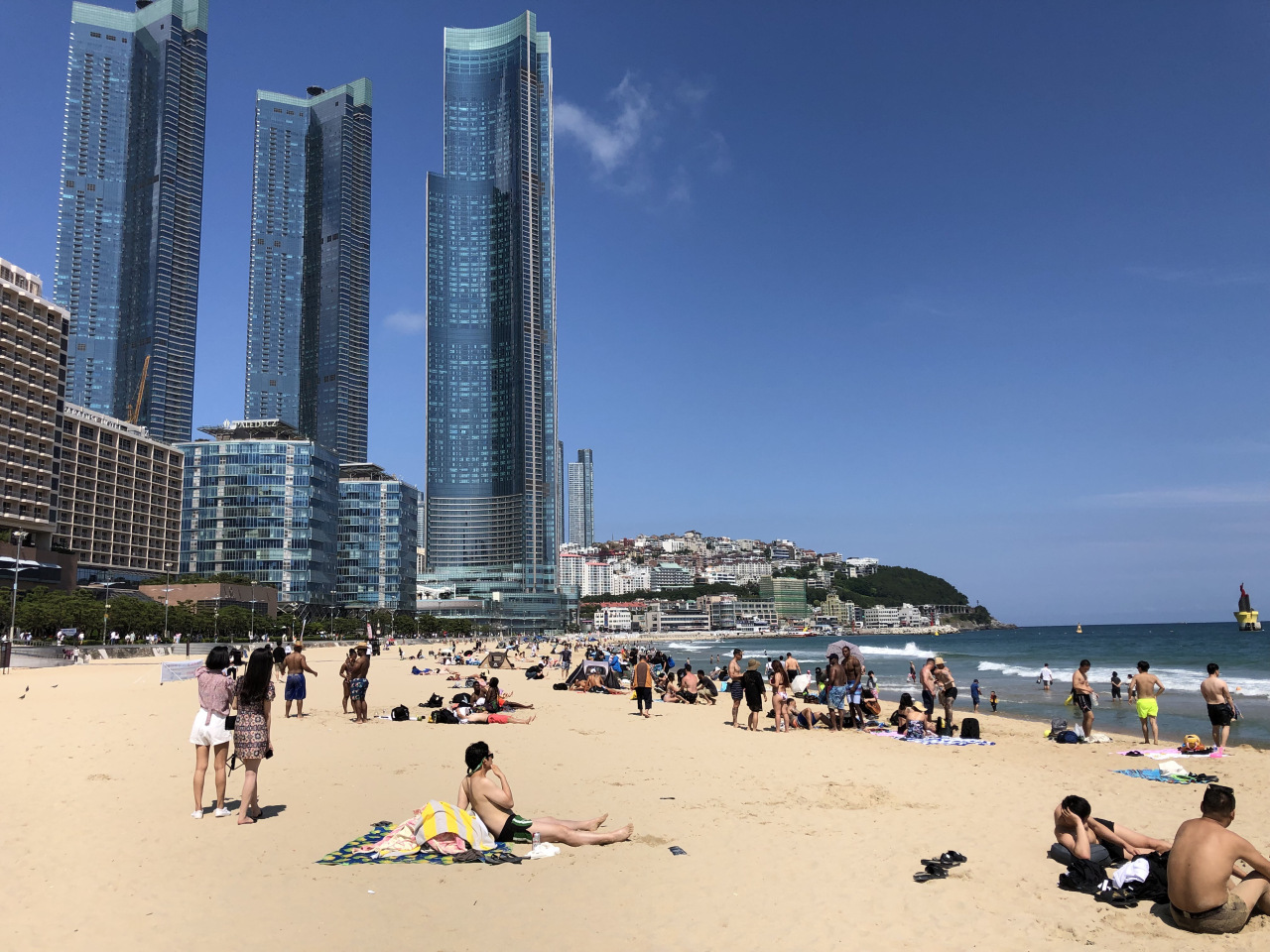BUSAN — With the arrival of summer holiday season, beaches are getting crowded in South Korea despite growing fears of a second wave of COVID-19 infections, causing a headache to health authorities in their efforts to contain the spread of the virus.
On Saturday afternoon the country’s most-visited beach, at Busan’s Haeundae, was brimming with early vacationers enjoying the sun.
Families, friends and couples sunbathed in groups, eating food on the beach and playing in the water.
“It is difficult to keep masks on as we get in and out of the water,” said Han Yoon-hee, with her mask hanging loosely over her jaw. “I let the children take off their masks because they might feel too suffocated in heat.”
“For now, I feel safe to be here because there are not many people, but I don’t think I would come to the beach if it gets too crowded. It would be difficult to keep a distance from others,” said Han, who was sitting with her two young children near the end of the beach to avoid crowds.
The beach, which draws as many as 300,000 people on a busy day, was not as crowded as usual, and there was enough space for groups to keep a two-meter distance from each other.
Most of them, however, were not wearing masks.
“I hope other people also keep masks on for others’ safety,” said Jay Kim, who came to the beach with his friend and family. He was among those wearing a mask.
The Busan citizen said that he is worried about possible transmission of the coronavirus in the upcoming peak season with beaches getting crowded with tourists from all parts of the country.
“I think I will stay away from the beaches,” he said.
There were not yet police or lifeguards walking around to ask people to wear masks. Occasionally, announcements were blared from loud speakers and signboards stood in the sand to remind the beachgoers to abide by safety rules.
Not much change was visible at the 1.5 kilometer Haeundae, one of a few beaches that are officially open to the public with safety rules in place. Most local governments with beaches have delayed their official openings by about a month amid the pandemic.
More changes are expected to come once some 260 beaches across the country begin to open starting on July 1.
The Ministry of Oceans and Fisheries plans to run signal lamps, which show the degree of crowdedness and can be checked on a website, starting on July 1 for 10 major beaches, including Haeundae. The lamps will be installed at 50 beaches by mid-July to help people avoid crowded beaches.
Health authorities released earlier this month basic quarantine and safety rules to minimize risks of infection. The rules include: visiting smaller beaches, refraining from visiting beaches in large groups, refraining from spitting, installing parasols at least two meters away from others and wearing masks.
Based on the rules, municipalities are devising their own safety measures to prevent the spread of the coronavirus ahead of the high season.
A reservation system will be introduced for 14 beaches in South Jeolla Province, requiring visitors to make bookings online and provide their contact information in advance.
The reservation system, however, is not likely to be expanded to other long-stretching, popular beaches, with local governments running popular beaches skeptical about the feasibility and effectiveness of the policy.
“Haeundae beach, which is in proximity to the city center, attracts more than 300,000 people a day during the peak season,” said an official from the Busan Metropolitan Government. “It is too crowded and busy to implement and control the reservation system. It will not be possible to apply it in reality. We cannot restrict visitors from coming to the open space.”
“For now, we will just try to implement quarantine measures thoroughly to minimize risks of infections,” she said.
In case of Haeundae beach, beach facilities — including shower booths and toilets — are being disinfected and ventilated at least twice a day. Only a limited number of parasols — around 2,000 — will be available on a first-come, first-served basis, with visitors required to submit their names and contact details. To ensure physical distancing and mask-wearing among beachgoers, around 70 more people than usual will be dispatched at the beach. A separate place for those showing symptoms of COVID-19 infection will be in operation, according to the official.
South Chungcheong Province is pushing to make it mandatory for all visitors to get fever checks and wear location-tracking wrist bands.
Other municipalities are also devising plans in consultation with the Oceans Ministry.
As the scorching heat is expected to lure more people to beaches, authorities continue to stress that keeping prevention requirements — such as mask-wearing and maintaining physical distance from others — are the best defense against a “second wave” of infections.
